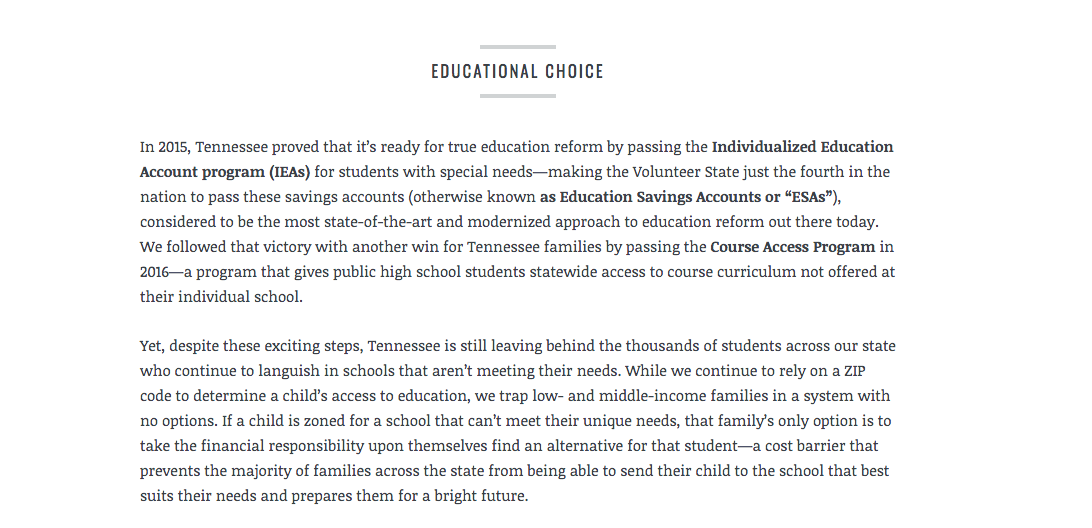The last week of January is National School Choice Week, a week dedicated to advocating for policies that promote education freedom for families, allowing parents to choose the education best suited for their children. However, the spotlight on support for school choice should extend beyond one week, especially being that it is one of the few nonpartisan issues that is popular throughout the country — and not just with Republican primary voters, but also among 71 percent of all voters, across all demographics and the general electorate.
Tennessee is one of 13 states with an education savings account program, which allows lower-income families to receive approximately $7,000 per year in private school tuition assistance. Growing up in a zip code where poverty ran rampant, I was able to qualify for an education savings account, an opportunity that changed my life path completely.

My mom and my grandmother were the matriarchs of the family, and my school choice journey began with them. They were the biggest advocates for my siblings and me, always looking for opportunities to help us get ahead and seeking resources to break down the barriers we faced in accessing a quality education.
Instead of being relegated to the schools that we were zoned for, school choice allowed me to attend New Hope Christian Academy, opening my world up to new possibilities through an exceptional education I would not have otherwise received. New Hope cultivated in me a commitment to hard work and servant leadership, and inspirited the notion that my biggest hopes and dreams could become a reality.
For middle and high school, I continued my journey at independent schools and attended Evangelical Christian School, where I learned academic discipline and outside-of-the-box thinking. Advanced classes and extracurricular activities prepared me for college, challenging my worldview and thought process constantly.
After graduating from Evangelical Christian School, I attended University of Memphis where I graduated magna cum laude with a degree in social work. While achieving something like this is attributed to many different factors, the undeniable reality is that the foundation laid by my private schools was instrumental in my success. I currently work for City Leadership, one of the top nonprofit consulting firms in the city of Memphis, and originally made the connection through my school choice journey.
It would have been impossible for me to realize my full potential without the opportunities and support system that school choice afforded me. I aspire to see more students who are just like me, overcoming their circumstances to rewrite their future. I truly believe that every family deserves the chance to choose their child’s education and have access to any school in their community, no matter their background.
In 2023, 20 states said “yes” to expanding school choice. These states either currently implement or are trying to implement policies that allow students to have a variety of choices when it comes to their education, whether that be traditional public schools, private schools, charter schools, or homeschooling. While this evolution of school choice across the country is remarkable, there are still millions of students stuck in school systems based on their family’s income or zip code that don’t fit their unique learning needs.
School choice is essential for the current and future generations of Tennessee, and our lawmakers should support education freedom here and for students across America through the Educational Choice for Children Act (ECCA), a federal tax credit scholarship bill that would help up to 2 million students access a school or education service of their parents’ choice.
The ECCA would fund scholarships with private donations, not federal money, and donors would receive a federal tax credit. Students could use scholarships for tuition, tutoring to address learning loss, special needs services, education technology, and more. The bill would triple the number of students benefiting from private school choice programs, and it would complement the programs already in effect in 31 states, while creating new opportunities in 19 states that lack the option of school choice. The legislation has more than 100 House co-sponsors and more than two dozen Senate co-sponsors.
My story is proof that there lies power in opportunity, and school choice can give you a chance to blaze a path for generations to come. Education is not “one-size-fits-all” and families deserve the opportunity to choose where their children will learn the best. I urge lawmakers to support school choice by supporting the ECCA so that every child has the opportunity to achieve academic success, despite their background.
Joi Taylor is Choose901 alumni director at City Leadership in Memphis and a graduate of the Tennessee Educational Savings Account Program. She was also recognized in the Memphis Flyer’s 20<30 class of 2020.


